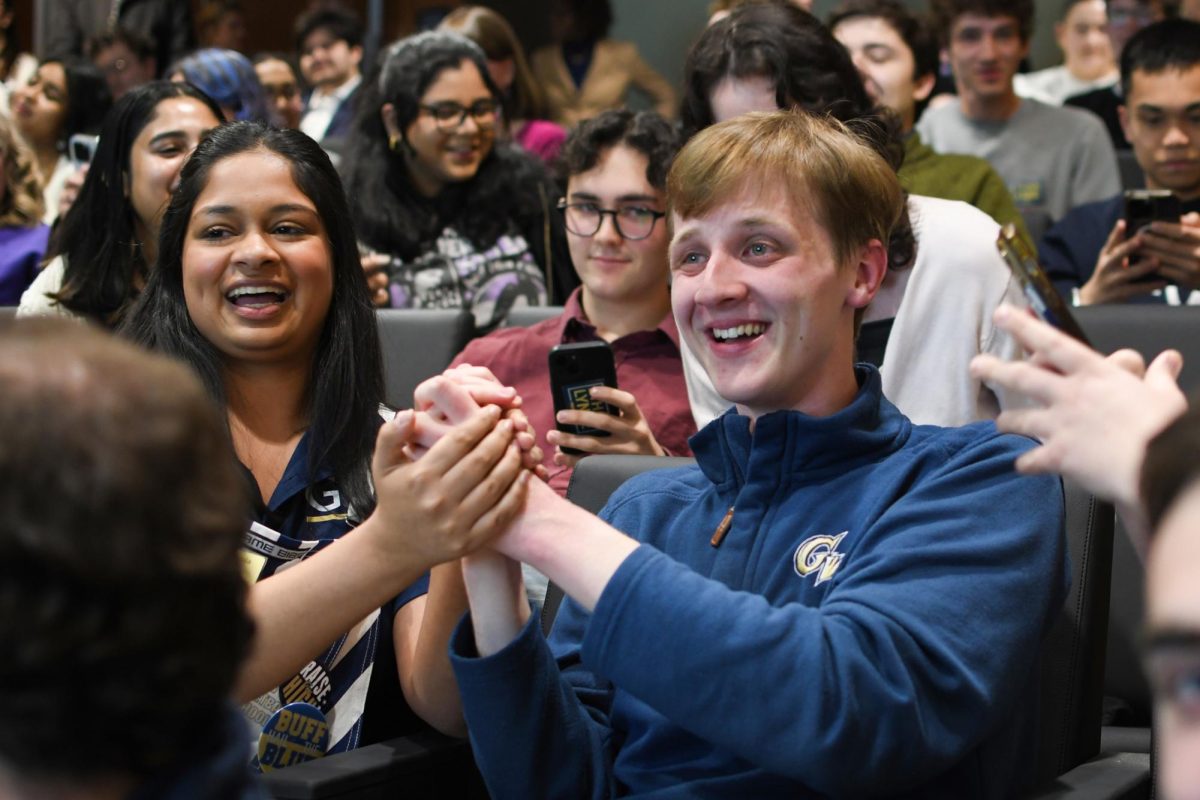Welcome Week will tip the balance from a typically entertainment-oriented event lineup toward hitting the books, reflecting the University’s intensifying desire to become a more academically minded institution.
The subtle twist in programming for students’ first week back on campus comes after GW’s highest academic leader, Provost Steven Lerman, also became head of student life operations last spring.
“I had a sense that perhaps the pendulum had swung a little too far on the, ‘Let’s all get excited and think of this as a great entertainment opportunity,’” Lerman said.
Academic programs – including a workshop on surviving the college workload, four events revolving around summer reading, a sustainability open house and a professor series called Last Lecture – have all made their way onto the Welcome Week calendar. The author of this summer’s freshman book, “War,” will speak Sept. 5, squeezed between annual events like Target Takeover, a hypnotist show, movie screenings and Fall Fest.
Lerman said the more balanced schedule falls in line with the plan to prioritize intellectualism.
When Lerman was hired away from the Massachusetts Institute of Technology in 2010, University President Steven Knapp said he would take the lead in meshing academics with student life.
“It’s a part of a much larger picture,” Lerman said. “Of course, just telling more people about it doesn’t in and of itself improve the quality of education. You actually have to improve the quality of education and research, and that’s really where the big investments are.”
“We haven’t radically transformed [Welcome Week], but I think we are trying to,” Lerman said.
Under former University President Stephen Joel Trachtenberg, GW appealed to students by building up the student life experience with bigger and better residence halls, splashy campus-wide programs like Colonial Inauguration and a Welcome Week full of freebies.
It worked. Applications rose 35 percent from 2001 to 2011.
Before student life offices began answering to the provost this spring, they reported to Robert Chernak – the former senior vice provost and senior vice president for Student and Academic Support Services – who alongside Trachtenberg helped quash GW’s reputation as a commuter school.
In his 24 years at GW, Chernak became the institution’s face of student life – until he retired in June.
“He was brought in to build an undergraduate population and an undergraduate community, and now that that’s here, that’s thriving,” an employee who has served under both administrations said, on the condition of anonymity to speak more candidly about internal discussions.
When Trachtenberg bowed out in 2007, the University ushered in an era of academics with the inauguration of Knapp, a literary scholar who was the provost at Johns Hopkins University.
Since Lerman, MIT’s former vice chancellor and dean for graduate education, arrived in Foggy Bottom two years ago, the University has pushed forward mammoth academic projects like the $275 million Science and Engineering Hall, a $16 million Gelman Library renovation and a $14 million investment in academic programs in the GW School of Business and the Columbian College of Arts and Sciences.
With Chernak’s departure this summer, the provost called together the offices now in his realm to lay out a vision for melding student and academic programs.
“He came in, took his jacket off, rolled his sleeves…and said, ‘This is where we’re going,’” the employee said, adding that talks of strengthening academics have been the buzz among leaders on the lower rungs of GW as well – all looking to “change a culture” under the school’s new leadership.
As administrators gear up for the release of a strategic plan in October, outlining 10 years of academic and research goals, Associate Provost and Dean of Student Affairs Peter Konwerski said more academic programming is a “natural progression” toward becoming a top-tier school.
“We’re trying to make Welcome Week a little less social – a little more academic in nature,” he said. “We’re trying to further solidify Lerman’s vision of integration between the student experience and academics.”
He said freshmen seem increasingly eager to jump right into classes and campus events that offer a chance for “intellectual discourse.”
“Students come here with real passion for issues,” he added. “It’s an important thing for us to be talking about.”
The provost’s office has also influenced programming at the Center for Student Engagement on a macro level.
Associate Dean of Students Tim Miller said the one-year-old office also has made its several dozen faculty in-residence members a greater part of students’ living experiences. It launched in 1998, and Lerman – who lived in residence halls at MIT – has expanded it considerably since his arrival. About 14 professors live in dorms on the Foggy Bottom and Mount Vernon campuses.
“We’re all aware that we’re in the vision within the provost’s team,” Miller said, adding that he is supportive. “All along, we’ve liked making the connections.”






